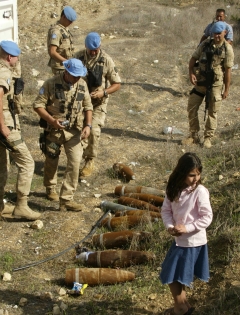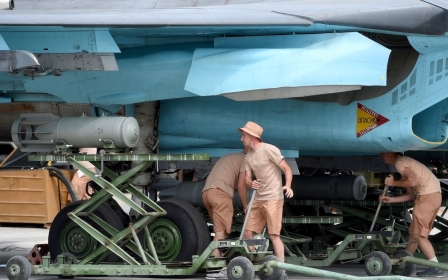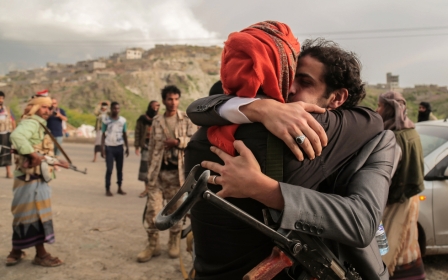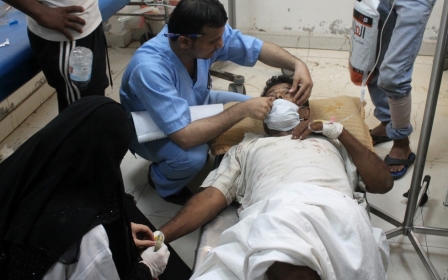Canadian firms invested in US cluster bomb makers, report says
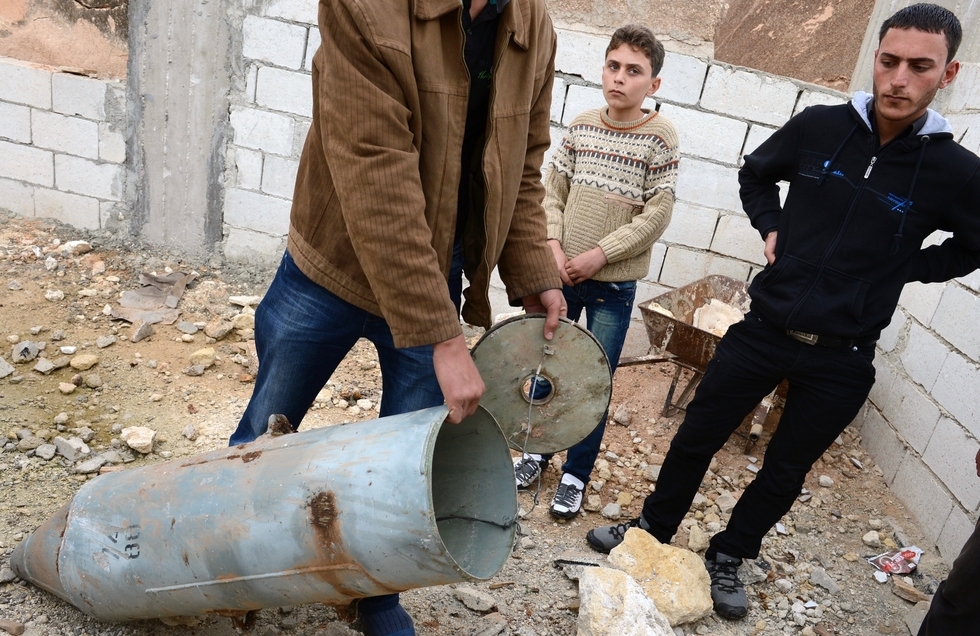
MONTREAL, Canada – Four Canadian financial institutions have invested in companies that manufacture cluster bombs, prohibited and highly destructive weapons that have been used in Yemen and Syria, according to a new report.
The Canadian firms contributed $565m between 2012 and 2016 to companies that manufacture cluster bombs, according to the annual cluster munitions investment report released by PAX, a Christian peace group in the Netherlands.
The Royal Bank of Canada (RBC), Canadian insurance companies Manulife Financial and Sun Life Financial, and Canadian investment fund CI Financial are identified in the report as investors.
“A lot of people have been reaching out to us about how they can ensure that their financial institution, their insurance, their bank, stops this practice because they don’t want their money used to assist in the production of a banned weapon,” said Erin Hunt, program coordinator at Mines Action Canada.
The PAX report says that RBC invested $132m in Textron Systems Corp., a US-based weapons company that makes cluster munitions, while Manulife invested $48m in the same company.
Sun Life invested $62m in another US-based weapons manufacturer, Orbital ATK, the report says, and CI Financial invested $72m in the company.
Orbital ATK is an aerospace and military company that also makes ammunition, warheads and missile defence systems, while Textron also manufactures aircraft, drones and armoured vehicles.
“Especially because cluster munitions are being used right now in Yemen and in Syria, it’s making the inhumane weapons much more personal. It’s no longer something happening on the other side of the world,” Hunt told Middle East Eye.
$28 billion in investments
According to the report, 158 financial institutions provided loans and financial services to seven cluster munitions manufacturers, and $28b of investments was made worldwide between 2012 and 2016.
Twenty financial institutions that made these investments are from countries that have joined the Convention on Cluster Munitions: Canada, France, Germany, Japan, Spain, Switzerland and the UK.
The Convention on Cluster Munitions was passed in 2008 and binds states to never use, develop, produce, or transfer cluster munitions, either directly or indirectly. It also bars states from assisting or encouraging anyone to engage in activities otherwise prohibited by the convention.
Canada signed the Convention on Cluster Munitions in 2008 and ratified it in 2015 when the government passed the Prohibiting Cluster Munitions Act.
While the convention does not explicitly outlaw investments in cluster munitions manufacturers, the Canadian government has asserted that such investments are considered to be assisting and encouraging prohibitions contained in the convention.
CI Financial spokesperson Murray Oxby told Middle East Eye that the firm’s shares in Orbital ATK were “sold a couple of months ago and CI’s funds no longer hold any shares of that company".
Catherine Hudon, a spokeswoman for RBC, told MEE that the bank’s policy prohibits directly financing equipment or material for cluster munitions.
“RBC is a responsible lender and practices a high level of due diligence prior to lending funds,” Hudon said in an email. “We are currently working towards extending this policy beyond lending.”
A spokesperson for Manulife Financial told MEE that Manulife is compliant with Canadian legislation and regularly reviews its investments.
“Manulife has publicly-traded securities in portfolios from some of the companies named in the report,” but it does not invest in primary issuance – such as initial public offerings or direct bond offerings – from companies that make cluster munitions, Brian Carmichael said in an email.
Sun Life Financial did not respond to MEE’s request for comment.
Canada ‘fully committed’ to convention
A spokesperson for Global Affairs Canada told MEE that the department is reviewing the PAX report. Canada is “fully committed” to the Convention on Cluster Munitions, Austin Jean said in an email.
“An investment made in Canada with the knowledge and intention that it will encourage or to assist cluster munitions production would be captured by the prohibition on aiding and abetting any primary offence contained in the Prohibiting Cluster Munitions Act,” Jean said.
“It would then be up to Canadian courts to decide whether the investment constitutes aiding and abetting in the production of cluster munitions or not.”
According to the Cluster Munitions Coalition, only 10 countries have enacted legislation against investing in cluster munitions so far: Belgium, Ireland, Italy, Liechtenstein, Luxembourg, the Netherlands, New Zealand, Samoa, Spain and Switzerland.
“It is too easy for producers of cluster munitions to access loans and financial services,” said Marion Libertucci, head of advocacy at Handicap International, in a statement.
“The number of financial institutions involved and the amounts invested are still very high… States must be held accountable and stop these investments.”
‘De facto landmines’
Cluster munitions contain hundreds of sub-munitions that disperse over an area the size of a football field, Hunt said. They can be dropped from the sky or from the ground in rockets or artillery and they are indiscriminate.
“The problem is that you can’t control where all these individual little sub-munitions land,” Hunt said. The sub-munitions also often don’t explode on impact, and “they become essentially de facto landmines, contaminating areas where civilians could be now or could be going in the future.
“They have humanitarian consequences both at the time of use and for decades afterwards when they fail to function as intended. We found that on average more than 90 percent of the casualties of cluster munitions are civilians,” Hunt said.
The Syrian government has routinely used cluster munitions since the war in Syria broke out. Recently, Human Rights Watch documented the extensive use of cluster munitions by allied Russian and Syrian government forces.
HRW also reported on the use of US-made cluster munitions in at least six attacks carried out by Saudi Arabia-led coalition forces fighting in Yemen.
The group documented a handful of attacks that employed the CBU-105 Sensor Fuzed Weapon, which is manufactured by Textron Systems, the same company in which the Royal Bank of Canada reportedly invested $132m.
One attack, in the Yemeni town of Hodaida on 12 December last year, injured a woman and two children in their homes, HRW reported, while two civilians were injured in another attack with the CBU-105 near al-Amar village in Yemen’s Saada governorate.
The US, which is not a signatory to the convention, maintains that the CBU-105 Sensor Fuzed Weapon has an unexploded ordnance rate of less than one percent – the threshold for export – and US export regulations mandate that the weapons not be used in civilian areas, HRW reported.
The US has recently sold the CB-105 to Saudi Arabia and the United Arab Emirates. But in late May, an unidentified US official told Foreign Policy magazine that the US had quietly placed a hold on shipments of cluster munitions to Saudi Arabia.
“Sensor Fuzed Weapons are touted by some as the most high tech, reliable cluster munitions in the world, but we have evidence that they are not working the way they are supposed to in Yemen,” said Steve Goose, HRW arms director and chair of the international Cluster Munitions Coalition.
Amnesty International has also reported that families in northern Yemen are returning to “de facto minefields” made up of unexploded sub-munitions from US, UK and Brazil-made cluster bombs dropped by Saudi-led forces.
At least 16 civilians were wounded or killed – including seven children who were hurt and two children killed – by unexploded ordnance, Amnesty found.
Setting clear guidelines
Hunt said the Canadian government must make it clear that investing in companies that manufacture cluster munitions is prohibited.
“The government needs to make it clear to financial institutions that cluster munitions are banned in Canada and assisting with the production of them is banned, so that investment and financial links to producers should be severed,” Hunt said.
Cutting financial ties to cluster bomb companies is an effective way to end the production of these weapons altogether, she said.
“If we can dry up the financial resources to make these weapons, while also working on the universalisation of the treaty to close the market for their sale, it will start to end the production of cluster munitions.”
New MEE newsletter: Jerusalem Dispatch
Sign up to get the latest insights and analysis on Israel-Palestine, alongside Turkey Unpacked and other MEE newsletters
Middle East Eye delivers independent and unrivalled coverage and analysis of the Middle East, North Africa and beyond. To learn more about republishing this content and the associated fees, please fill out this form. More about MEE can be found here.


